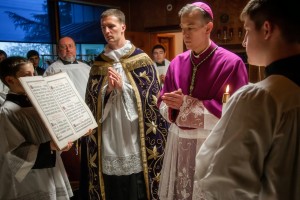 On March 1, 2014, Archbishop Alexander Sample of the Archdiocese of Portland in Oregon celebrated a Pontifical High Mass in the Extraordinary Form at the Brigittine Monastery of “Our Lady of Consolation” in Amity, Oregon. Archbishop Sample is an IRL Advisory Board member and the Brigittines are an IRL Affiliate community.
On March 1, 2014, Archbishop Alexander Sample of the Archdiocese of Portland in Oregon celebrated a Pontifical High Mass in the Extraordinary Form at the Brigittine Monastery of “Our Lady of Consolation” in Amity, Oregon. Archbishop Sample is an IRL Advisory Board member and the Brigittines are an IRL Affiliate community.
The Mass was the culmination of a three-day conference on Gregorian Chant and the role of sacred music in the liturgy sponsored by the Brigittine monks and Schola Cantus Angelorum. The conference drew priests, deacons, musicians, and others interested in learning about rich tradition of the Sung Gregorian Mass.
Pope Benedict XVI wrote: “In the history of the liturgy there is growth and progress, but no rupture. What earlier generations held as sacred, remains sacred and great for us too, and it cannot be all of a sudden entirely forbidden or even considered harmful. It behooves all of us to preserve the riches which have developed in the Church’s faith and prayer, and to give them their proper place.”
Click here to listen to the Archbishop’s homily. Some high points for me were his comments on why the the Extraordinary Form of the Mass is important. First, it extends pastoral care to those Catholics who remain attached to this beautiful liturgy. Second, we must remain in close communion to our past. We need a “reform of the reform,” that is reconnected to the Church’s rich tradition. Third, Gregorian chant is not meant to be listened to in the car; it’s proper place is in the Sacred Liturgy, it should be given a pride of place in the Sacred Liturgy.
Especially touching, was Archbishop Sample’s own testimony:
“When Summorum Pontificum came out, and the Holy Father said this is one of the forms of the Latin Rite, the Extraordinary Form, I said ‘I’m a bishop of the Church, I must know this rite!’ And I encourage my priests and my seminarians to learn and to know this rite. Even if you never have a chance to celebrate it, knowing it, experiencing it – I guarantee you – it will affect the way you celebrate the Ordinary Form. It will do so.”